Ireland: A Question for us all
Report of a London District Communist Party Delegation to Belfast
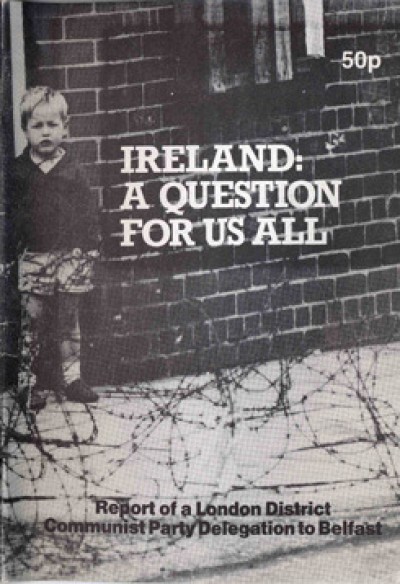
| Date: | 1983 |
|---|---|
| Organisation: | Communist Party of Great Britain |
| Collection: | The British Left on Ireland |
| View: | View Document |
| Discuss: | Comments on this document |
| Subjects: |
Please note: The Irish Left Archive is provided as a non-commercial historical resource, open to all, and has reproduced this document as an accessible digital reference. Copyright remains with its original authors. If used on other sites, we would appreciate a link back and reference to The Irish Left Archive, in addition to the original creators. For re-publication, commercial, or other uses, please contact the original owners. If documents provided to The Irish Left Archive have been created for or added to other online archives, please inform us so sources can be credited.
Commentary From The Cedar Lounge Revolution
6th December 2010
This is a document that describes the outlook of the Communist Party of Great Britain to the issue of Northern Ireland in the early 1980s. As noted in the Foreword, ‘the Report deals with the historical and political background to current developments in Northern Ireland and is informed by the Marxist analysis of the Communist Party of Ireland’.
Coming at a point after the Hunger Strikes the document offers a view of the ‘Roots of the Irish Crisis’ which includes an overview of Partition and after. It’s notable how the analysis of the events of 1968 onwards underplays the convulsions in Republicanism and the IRA, noting only that:
As the state thus went dramatically on the offensive, the response of the minority community inevitably sharpened: ever larger numbers within the nationalist fold took up arms, as the IRA - which had turned from military to political action through most of the 1960s - revitalised the armed struggle in the form of the Provisionals. Rent and rate strikes developed, and Stormont was boycotted by nationalist politicians.
The document argues that:
In Britain, Communists see their task as developing a clear ideological and political break between the working class movement and British imperialism which continues to rule in Northern Ireland with the tacit consent of the British people. We must fight to remove that consent and to demand a declaration of intent by the British government to withdraw from Northern Ireland, coupled with a broad programme for ending repression and instituting democratic reforms within the six counties that would create, in the shortest possible time, the political, social and economic conditions for the re-unification of Ireland.
There’s an interesting outline of ‘The Political Parties’, which starts, perhaps not unexpectedly, with the CPI. SF are positioned within ‘The Nationalist Camp’. It notes that ‘it would have been valuable to hear what account the Workers Party would have given of themselves. Formerly known as Official Sinn Féin in the Republic and the Republican Clubs in Northern Ireland (changing its name to the present title in 1982), and known as the political wing of the Official IRA, they have - in the words of one leading Irish Communist - undergone a recent ‘transformation from a radical republic [sic] party to a social democratic one [which] … Has appeared to be embarrassed by its republican past, and to have been incapable of defining republicanism except as antithetical to socialism’.
In terms of Sinn Féin the document argues that:
…one must recognise, however, that Sinn Féin today reflects two face so republican tradition, not necessarily in easy alliance. One is represented by a simpler nationalism that has found its motive force in the middle class or in rural areas: more committed to the military cause, it has also tended to be hostile to progressive tendencies within the movement. Indeed when PSF (and the PIRA) was formed in 1969-70, it was largely as a reaction against a diminishing commitment to the military struggle in favour of more socialist political activity. That political dimension, the other face of the Republican tradition, has in the last few years begun to reassert itself within Provisional SF as well - a strong indication that it arises out of undeniable material circumstance of life in NI.
It continues:
This progressive trend, which now gives the appearance of being in the ascendancy within SF and is represented by Gerry Adams and other young members of the party, has its roots in the working class around Beflast and Derry, the two principle industrial centres in the six-counties and represent a legitimate, but still rather nebulous (and certainly non-Marxist) socialist viewpoint which can only gain in coherence and conviction to the degree that Sinn Féin is not isolated from other progressive forces.
There’s considerably more including an analysis of the Unionist camp, though the document notes that ‘the members of the Delegation were keenly interested in talking with representatives of the Unionist tradition in NI. Regrettably, no response to its invitation was forthcoming from either the OUP or the DUP’.
On the other hand it also notes that ‘they were able to meet with a leading member of the Ulster Defence Association, Andy Tyrie’. And it notes that ‘although atypical of Unionism in general, the UDA does give an idea of the contradictions within the Unionist all-class alliance, as it seeks to represent a working class dimension’ though the Report is quick to point out that ‘it also expresses certain distinctive class views of conditions in NI that are not found in the main Unionist parties, in particular an apprehension of capitalist interests which was expressed in terms of a vague and hesitant ‘socialism’. These tendencies, perhaps better understood as a kind of populism, reflect the worsening economic situation for many Protestants in NI…’
It also contains an overview of Repression and an outline of the social costs of the conflict as they impact on different groups. It concludes with a strategy for reunification.
More from Communist Party of Great Britain
Communist Party of Great Britain in the archive
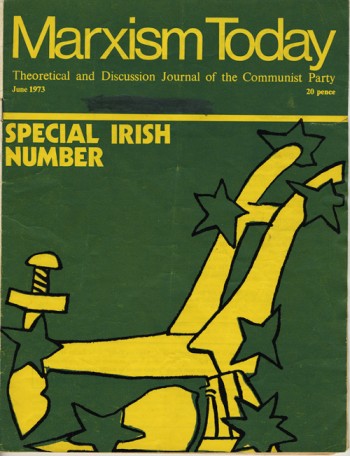
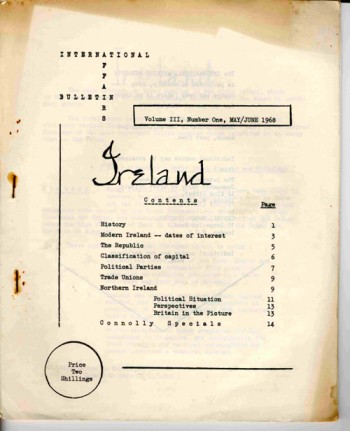
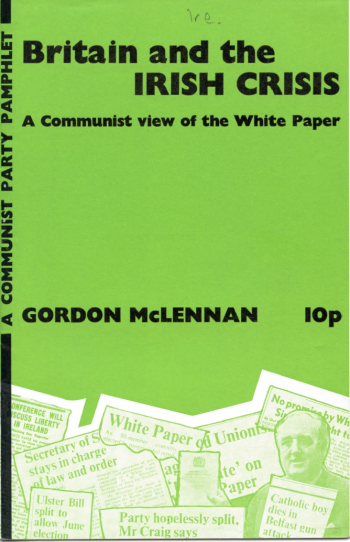
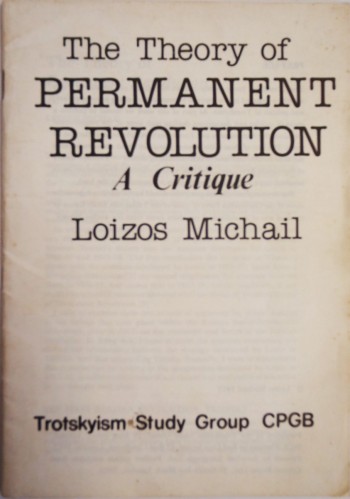
Comments
No Comments yet.
Add a Comment
Comments can be formatted in Markdown format . Use the toolbar to apply the correct syntax to your comment. The basic formats are:
**Bold text**
Bold text
_Italic text_
Italic text
[A link](http://www.example.com)
A link
You can join this discussion on The Cedar Lounge Revolution
By: Mervyn Crawford Tue, 07 Dec 2010 12:07:22
Asking your oppressor to not oppress is akin to agreeing to ‘negotiate’ with your employer or the state concerning your rights and work.
“We DEMAND that you say you will leave us alone sometime in the future! Or else! I’m telling ya!
Hold me back!”
Reply on the CLR
By: Mark P Tue, 07 Dec 2010 13:03:30
It’s interesting that the CPGB had such a dismissive attitude towards the Workers Party at this late stage. I thought that by the early 80s the WP had established “fraternal relations” with most of the Moscow-line parties.
Reply on the CLR
By: Paul Wilson Tue, 07 Dec 2010 14:04:50
I was in the CPGB at the time and their position changed suddenly round about 1977 from fairly supportive to dismissive as you say Mark, that was if they even mentioned the WP. The change was signalled in an article in the Morning Star by Chris Myant. No reason for this change in outlook was ever given as far as i can recall. I assumed that it was a reflection of the widening policy gap between the CPI and the WP in Ireland and that the CPGB was in support of the CPI as might be expected.
Reply on the CLR
By: Jim Monaghan Tue, 07 Dec 2010 14:38:13
At one stage the CPI sent a letter denouncing the WP to fraternal parties. An Australian Trotskyist group got it. They were called the Communist League.
The CPI was annoyed by the anti-republican stance.he CPIs stance on the national struggle was outlined by Desmond Greaves and later by Tony Coughlan
They also had an idea that they were the real workers party and the job of Official SF was to be the peasants and petit bourgeois party that would accept the hegemony of the proletarian party.
Reply on the CLR
By: Jim Monaghan Tue, 07 Dec 2010 14:40:05
In reply to Mark P.
Rivals not friends for the Moscow franchise. Not unique to the CPs, some of the mini internationals have the same farce.
The WP was close to the GDR and the French CP.
Reply on the CLR
By: Neues aus den Archiven der radikalen (und nicht so radikalen) Linken « Entdinglichung Thu, 09 Dec 2010 09:43:13
[…] Ireland: A Question for us all: Report of a London District Communist Party (CPGB) Delegation to Bel… […]
Reply on the CLR